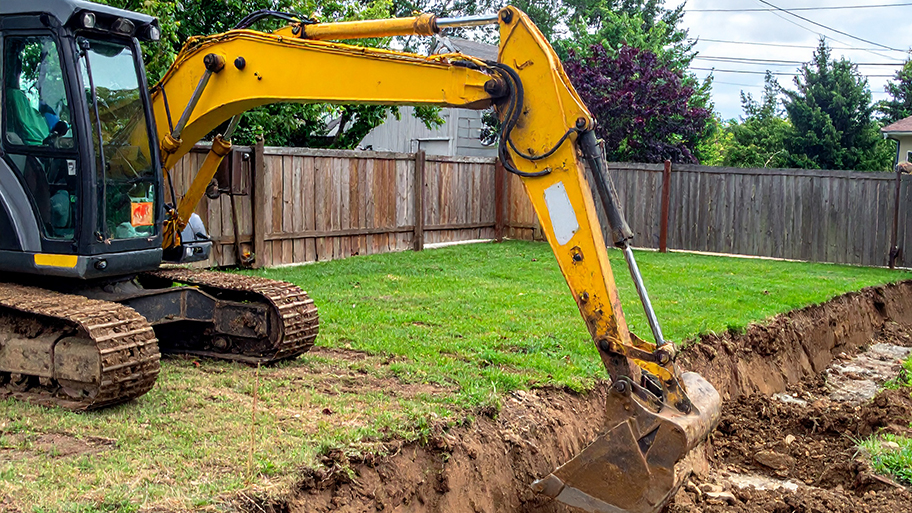
The cost to re-level your mobile home depends on your home’s location, size, and whether it needs extra support. Read more about the cost of leveling your mobile home.
Excavation pros can help you dig your way out of a lost weekend


If you’re embarking on a complicated trenching job, don’t have the time, or have other limitations that keep you from being able to dig a trench for your project, you may be asking who can dig a trench for you. Home improvement projects sometimes require digging a trench that's too large or complex to DIY, and hiring a professional excavator lets you avoid costly and dangerous mistakes. Let's get into the benefits of hiring an excavator for trenching projects.
For bigger trenching jobs that you don’t want to take on, hiring an excavation pro near you is the best way to go. Here’s why:
A local excavation company will have all of the proper tools and equipment to get the job done so that you don’t have to orchestrate costly equipment rentals, complex land surveying, and any other tools and tasks needed to dig the trench.
Rocky terrain, tree stumps and tree roots, and electrical wires can quickly complicate what may have initially seemed like a simple DIY job. Luckily, the pros have high-power tools that can easily break up stubborn soil and debris.
Professional excavators should be licensed and bonded in case they or anyone in your household is injured as a result of the job. Trench digging can get dangerous since there are power lines, pipework, rocks, and other complex natural and mechanical elements in the ground outside your home. A professional excavator can offer you peace of mind since they have the right equipment and expertise to safely dig the trench you need at the correct size.
“Logistics and timing are two things that come with the price when you hire professionals to do this kind of work for you, and with that comes the security that if anything goes wrong, they will be on the line for it and not you.”
— Josh Rudin, Owner of ASAP Restoration LLC, Tempe, Arizona
Digging a large trench by yourself is intense work that can take several hours. Renting a trencher can make the job go faster, but not all home and terrain types are suitable for a trencher. Excavation pros have the teams and tools to make the job faster and safer so that you can relax on the weekend instead of laboriously digging like you’re an extra in a pirate movie.

If your home is surrounded by flat terrain that’s free from tree roots and you feel confident in your DIY abilities (including running heavy machinery), digging a trench yourself is possible. Renting a trencher costs $125 per day, with additional supplies and tools costing another $200 or more.
However, trenching is still incredibly dangerous for DIYers because small mistakes can lead to costly and potentially life-threatening outcomes. For example, you could hit a power line, run into tree roots, or cause a soil cave-in. Although digging a trench yourself is technically within the realm of possibility, most trenching jobs should be left to the experts. Professional trenching costs $400 to $1,200 on average, and the price is well worth it for your safety and peace of mind.
Some handypeople can make a simple trench digging job go faster if your home is on flat terrain free from rocks, tree roots, and protruding power lines. However, unless the handyperson is a licensed contractor who has worked with trenching machinery and logistics before, trench digging should be left to an excavation pro.
An excavator first plans their approach. They examine where your power lines and other utilities are located, if any pipe or bedding needs to be staged, and whether additional shoring is needed for the trench. Next, your excavation expert will determine the type of soil in the area so that the machinery can be safely positioned to avoid cave-ins. Then, they’ll mark a path on the top layer of the soil to dig along and stabilize the trencher so that its placement on the ground is as even as possible.
With the trencher, your pro will gradually dig down and along your property, layer after layer, until they get to the correct length and grade. They’ll make adjustments if they need to dig the trench in a hilly area or require additional machinery to work around rocks, tree roots, and other obstructions.
From average costs to expert advice, get all the answers you need to get your job done.

The cost to re-level your mobile home depends on your home’s location, size, and whether it needs extra support. Read more about the cost of leveling your mobile home.

Digging a trench is usually the first step in a larger home project. Our trenching cost calculator breaks down the factors that affect the price tag of this job.

If you need to dig a trench, you might be tempted to do it yourself instead of hiring a pro. So, how much does it cost to rent a trencher? Let’s break it down.

When digging for utility installation, you may wonder if gas and electric can be in the same trench. Find out the basics to utility trenches in this guide.

Who installs trench drains? A local excavation company is best for the job, but a landscaper or plumber can also get it done. Here's how.

Trenching is simpler and boring is best for complex properties. Learn all about boring versus trenching and when to use each.